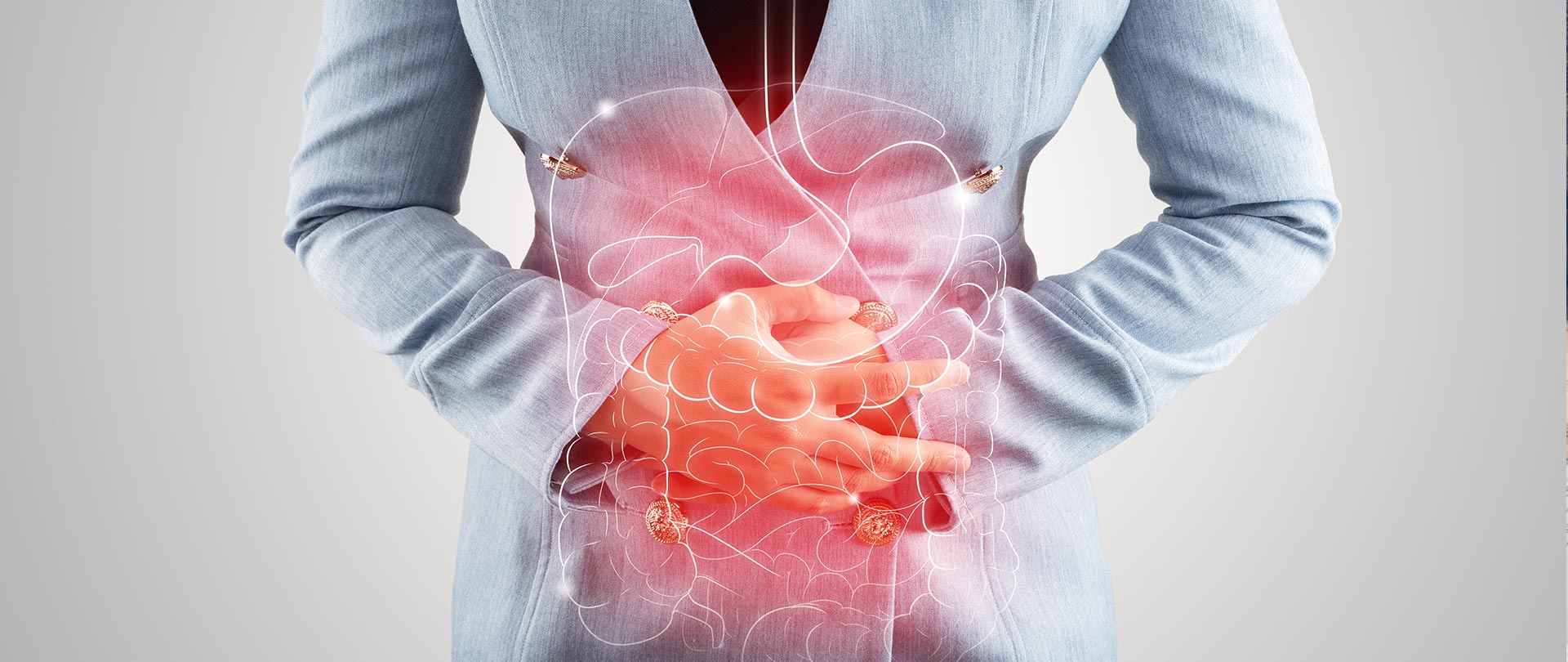Irritable bowel syndrome (IBS) is a common disorder that affects a person’s large intestine. The condition is characterised by abdominal pain, bloating, and alternating constipation and diarrhea. Around 15% of Australians are diagnosed with IBS each year and occurs mostly in early adulthood. Women are more susceptible to having IBS than men and tend to experience more severe symptoms. IBS does not lead to permanent damage to the digestive tract and does not increase the risk of developing more serious bowel conditions like colitis or cancer.
Although there is no simple cure for IBS, there are a number of treatment options available for managing IBS. Reducing stress levels and making both dietary and lifestyle changes can help with symptoms of IBS. Current pharmacological treatment for IBS focuses on alleviation of its symptoms, and not on the elimination of its cause. Over the counter medications are available to relieve abdominal pain, cramps, diarrhoea or constipation, taken as directed by a doctor or pharmacist. A limited range of prescription medications may also be prescribed if needed.
What are the symptoms of IBS?
The most common signs of irritable bowel syndrome are:
- Abdominal pain or cramping that is often relieved by passing gas or faeces
- Alternating constipation and diarrhoea
- Feeling of incomplete emptying of bowel after going to the toilet
- Abdominal bloating
- Mucus in the stools
- Nausea
- Urgent need to go to the toilet
The symptoms of irritable bowel syndrome can vary for each individual and they tend to come and go over a period of time. Symptoms can last for several days or even weeks, with some episodes worse than others, and can significantly impact a person’s quality of life.
IBS symptoms are not specific to IBS alone and can be caused by other conditions such as coeliac disease (sensitivity to gluten) which can lead to damage in the lining of the intestine. Therefore if you are experiencing these symptoms, it is important to consult your GP and not to self-diagnose, especially if the symptoms develop when you are over 40 years of age, if you have a family history of bowel cancer, or if there are other signs or symptoms suggestive of another underlying issue.
What causes IBS?
The exact cause of irritable bowel syndrome is unclear. The condition may be due to an increased nerve sensitivity in the bowels, abnormal bowel contractions and chronic inflammation. The intestinal muscles can become hypoactive or hyperactive, leading to pain, cramps, flatulence and sudden episodes of diarrhoea and/or constipation. There are a number of triggers to IBS symptoms. Infections such as gastroenteritis is a common trigger and this may be related to change in nerve function or bacterial environment of the bowel. Food intolerances such as to lactose can also trigger IBS. Other triggers include psychological factors such as anxiety and stress, and medications such as antibiotics, antacids and certain painkillers which can cause diarrhoea and constipation.
How acupuncture and Chinese medicine can help with IBS
Traditional Chinese medicine (TCM) revolves around the principle of Yin and Yang and the Five Elements. Its diagnosis and treatments aim to achieve good health by restoring the internal balance within the body. TCM takes a holistic approach to wellness by addressing the underlying cause as well as the symptoms. TCM practitioners understands that each individual’s symptoms may vary and their body condition is unique, therefore they approach IBS on an individual, case by case basis. Treatment is tailored to what each IBS patient needs to alleviate their symptoms and treat the underlying imbalance in the body.
TCM practitioners believe there is an energy flow in channels throughout the body called “qi” and when this energy flow is disrupted, it can lead to sickness and disease. Acupuncture is an integral practice of TCM where thin, sterile needles are inserted at different acupuncture points in the body to remove blockages and restore the healthy flow of qi. According to TCM theory, IBS is mainly caused by excessive dampness and heat in the body, either obtained externally (such as from weather) or generated internally (such as internal injury from certain food). TCM uses acupuncture to remove dampness and heat from within the system by selecting specific acupuncture points along the channels of the stomach and large intestine. This can help improve IBS symptoms, strengthen the body’s immune system, relieve stress and prevent future exacerbations.
Acupuncture is a popular alternative treatment for IBS and other conditions. It’s been proven effective for treating chronic pain, according to researchers at the National Institutes of Health (NIH). Research has also shown that acupuncture may benefit IBS symptoms by:
- Relieving abdominal pain
- Regulating the motility of the digestive tract
- Raising the sensory threshold of the gut
- Decreasing anxiety and depression
However, study results on acupuncture in IBS are mixed and more larger trials are needed to fully support the claims of acupuncture in helping with IBS. Some researchers think that acupuncture can stimulate electromagnetic signals in the body, which may promote the release of pain relief chemicals or jumpstart the body’s natural healing mechanisms.
Another important component of TCM is Chinese herbal therapy. The practitioner formulates a specific combination of herbs to address the specific condition of the patient. The individualised approach of herbal medicine allows the practitioner to treat not just the symptoms, but the underlying cause and overall condition of the patient. Most TCM practitioners use “classic formulas” as a foundation. Many classic herbal formulas have been used for over 2,000 years, herbs can be added or subtracted from these formulas to meet the needs of individual patients. Chinese herbal medicines have a valuable role in the management of IBS, as well as other gastrointestinal disorders.
Acupuncture and Chinese herbal medicine can be used in combination for management of IBS by relieving pain, reducing stress, improving bowel function, increasing immunity against infection, and restoring balance into the body. They can also compliment existing conventional treatment with western medicine, however it is wise to check with your doctor first in case of any interactions.
How we can help
At Baolin Acupuncture and Chinese Medicine Centre, we use a combination of acupuncture and Chinese herbal medicine to help manage IBS. IBS is a complicated condition with many manifestations that require very different treatment approaches in TCM. Therefore we customise TCM treatment for each individual. In addition to acupuncture and herbal therapy, our practitioners give dietary and lifestyle recommendations that can help patients with managing IBS symptoms. Working with our supportive TCM practitioners, other associated issues such as stress and anxiety can also be addressed, which will have a positive impact on both mood and IBS symptoms.
For more information regarding acupuncture and herbal medicine for managing your IBS symptoms please contact us at our Perth or Subiaco clinic (Perth: 9228 8828; Subiaco: 9380 4171). Alternatively, you can send us your queries through our online contact page.


